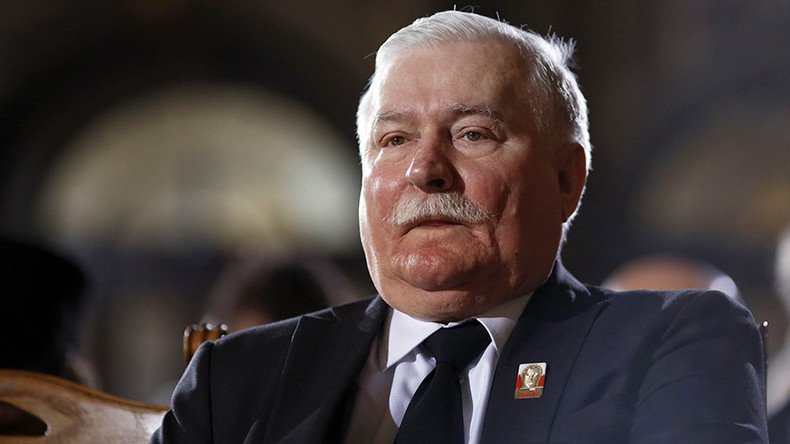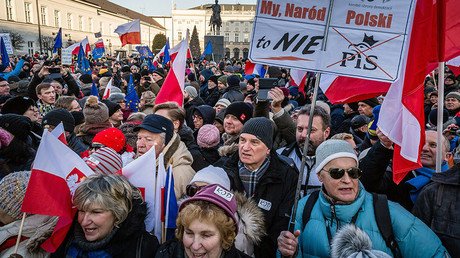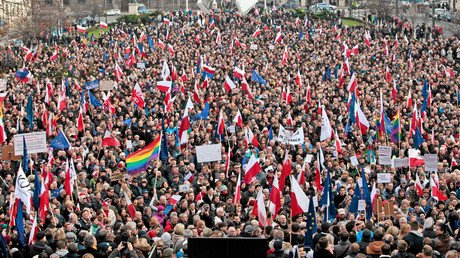Polish institute accuses democracy-hero Walesa of being communist collaborator

The leader of Poland’s Solidarity movement and pro-democracy activist Lech Walesa has been accused of working for the country’s secret police in the 1970s. The claims were made by a Polish institute responsible for exposing communist-era and Nazi-era crimes.
The National Remembrance Institute says it has obtained written proof that Walesa was in fact a communist informant. The organization says it accessed documents, which have been confirmed as genuine, from the home of the widow of General Czeslaw Kiszczak, who was also communist Poland’s last prime minister.
"The personal file contains an envelope and in it there is a manually written commitment to collaborate with the secret service signed: Lech Walesa "Bolek"," said Lukasz Kaminski, who heads the National Remembrance Institute.
Lech Walesa is by no means flawless. But indeed no historical figure are. His problem is that he made history, not wrote it.
— Leszek Jażdżewski (@LesJazd) February 18, 2016
Apparently dating from the 1970s, the documents also contain payment receipts signed by "Bolek", Kaminski added, as cited by AFP.
Walesa, who was the co-founder of the Solidarity movement, which brought down the communist regime in Poland, says he is willing to defend himself in court against the allegations.
He says he did not sign the documents and added that they could have been forged. "I will prove it in court," he wrote in a blog, according to Reuters.
Walesa, who won the Nobel Peace Prize in 1983, has long denied rumors that he gave information to the communist regime, while he was the leader of Solidarity. He accused Kaminski and his agents of falsifying documents in order to discredit him. In 2000, a special court cleared him of having collaborated with the secret police.
However, the Deputy Prime Minister Mateusz Morawiecki does not believe Walesa.
"Walesa has an agent's past, of course he does. For the last 27 years I not only suspected this but was almost sure,” he said, according to Reuters.
The National Remembrance Institute has links with the ruling Law and Justice Party. The political organization has also argued that Walesa and other pro-democracy activists had been helping the communists.
Walesa, who became the first Polish president in 1990 following the end of communist rule, criticized reforms to the media and judiciary by the party once they came to power, while he also hit out at Jaroslaw Kaczynski, the leader of the Law and Justice Party.
"Kaczynski is definitely a great intellect and his diagnosis of the situation in Poland is right, but the cure he applies is very disputable," the former president told AP.
Under new laws introduced by the Law and Justice Party, the treasury minister will now have the power to appoint and sack senior figures in public radio and television, as opposed to them competing for the appointment that was made by the National Broadcasting Council under the previous rules.
Several key figures in the Polish media resigned in an act of protest, saying they would be sacked if the new laws were passed. These included the heads of three of Polish public broadcaster TVP’s TV channels, and the head of its human resources department.
Warsaw also introduced changes to the Constitutional Court raising the quorum for deciding the most contentious cases from 9 to 13 judges out of 15 – thus making it harder to secure rulings.
The moves resulted in condemnation from the EU, but Polish Prime Minister Beata Szydlo scolded the bloc for wasting “so much time” monitoring Warsaw’s internal issues at a time when it had its own urgent problems to address.
“I must say I do not see the need to devote so much time to Poland ... I think you have many important issues to address,” Szydlo told Members of the European Parliament, while rejecting the EU’s harsh criticism of her government’s policies.














